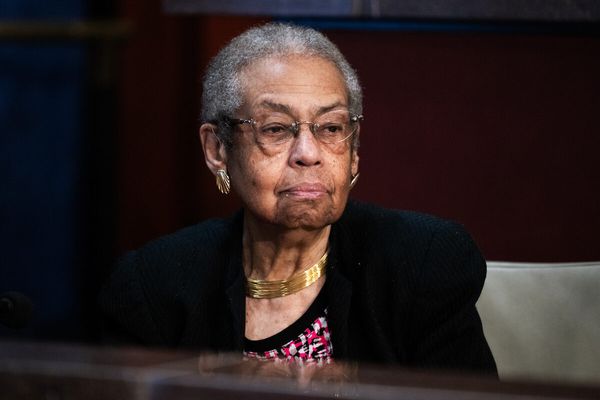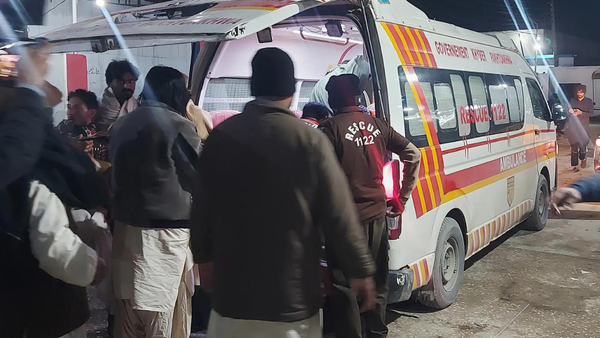
Joe Biden took fresh steps on Friday to lure India’s prime minister, Narendra Modi, into an alliance designed to contain China, at a bilateral meeting in Delhi where the pair struck a series of commercial and defence deals covering remote-controlled aircraft, semiconductors and quantum computing.
However, the question of press freedom also dominated the agenda on the eve of the full G20 summit as journalists were blocked from covering the event. Before the bilateral at the prime minister’s residence, the US press corps, used to being given privileged access to the president, were told to remain outside in a van, out of eyesight of the two leaders.
Biden received a Bollywood-style greeting after landing onboard Air Force One, with dancers in flowing purple outfits performing to American pop music.
The meeting was given an added symbolic importance as Biden was able to seize upon the Chinese president Xi Jinping’s decision not to attend Modi’s much-vaunted summit. The US is trying gradually to make the traditionally neutral India a more explicit partner and part of a wider political and defence alliance in the Indo-Pacific.
The White House said in a statement after the meeting that Biden welcomed the joint commitment to democratic values, and specifically that he welcomed an Indian defence department request to buy US-built remotely controlled aircraft.
India has a number of disputes with China but it has been wary of joining an implicitly anti-Beijing alliance. Kurt Campbell, the White House Indo-Pacific envoy, said relations with India continued to be a work in progress.
The two leaders agreed to progress agreements reached in June, when Modi visited Washington, including a deal to allow General Electric to produce jet engines in India to power Indian military aircraft.
The US does not expect to make immediate progress in shifting India from its largely neutral stance on the Russian invasion of Ukraine but believes that if it can start to replace Russia as a leading arms supplier to Delhi, India will have greater latitude to criticise Moscow.
The episode with the journalists accompanying Biden underlined the state of press freedom in India despite the two leaders’ stated shared commitment to democracy. The prime minister’s office released a handful of official photographs of the meeting, showing the two leaders seated side by side and chatting amiably.
Biden decided to delay his planned post-summit press conference and hold it at his next stop in Vietnam, reflecting the tight press controls being mounted by the Indian security services.
The incident comes after protracted negotiations were needed before Indian officials agreed to Modi taking one question from US reporters during his visit to Washington in June.
“The president believes the free press is the pillar of our democracy,” the White House spokesperson Karine Jean-Pierre told journalists onboard Air Force One, insisting they were doing all they could to secure media access.
At the Washington press conference with Biden in June, the one question to Modi came from the Wall Street Journal reporter Sabrina Siddiqui, who asked the Hindu nationalist about accusations of repression of Muslims in India and the country’s record on human rights.
Siddiqui was subsequently subjected to “intense online harassment”, the White House Correspondents’ Association said, “including from people with ties to the prime minister’s political party”.
India ranks 161 out of 180 in this year’s Press Freedom Index published by Reporters Without Borders. In recent years, journalists have been arrested and some are stopped from travelling abroad. Dozens are facing criminal prosecution, including for sedition. The government has also introduced sweeping regulatory laws for social media companies that give it more power to police online content.
A number of media outlets critical of Modi have been subjected to tax searches, including the BBC after it aired a documentary that examined the prime minister’s role in 2002 anti-Muslim riots in the western state of Gujarat, where he was chief minister at the time.
The US treasury secretary, Janet Yellen, joined the bilateral, as did the White House national security adviser, Jake Sullivan. Indian attenders included the external affairs minister, Subrahmanyam Jaishankar, and the security adviser Ajit Doval.
Biden is bringing cash for the World Bank and promises on the climate crisis that he hopes will show debt-ridden economies in Africa that he has their interest at heart in a way that the Chinese Belt and Road infrastructure project does not.
Biden sets great store by personal relations in diplomacy, and has done as much with Modi as with any other world leader to cultivate a personal relationship. He continues to raise human rights, his aides say, but it is clear Biden has put the treatment of religious minorities in India on a relative back burner.
Chinese-Indian relations were damaged before the summit as the Chinese ministry of natural resources website displayed Arunachal Pradesh and the Doklam Plateau – over which the two sides have feuded – as included within Chinese borders, along with Aksai Chin in the western section that China controls but India still claims.







